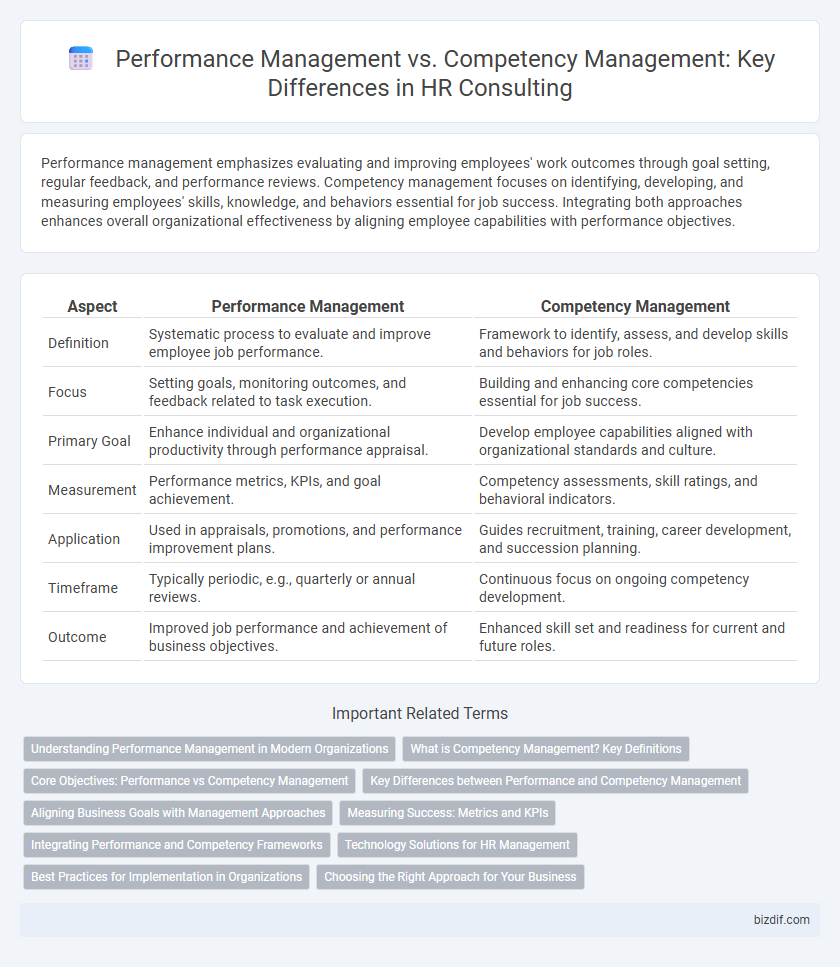Performance management emphasizes evaluating and improving employees' work outcomes through goal setting, regular feedback, and performance reviews. Competency management focuses on identifying, developing, and measuring employees' skills, knowledge, and behaviors essential for job success. Integrating both approaches enhances overall organizational effectiveness by aligning employee capabilities with performance objectives.
Table of Comparison
| Aspect | Performance Management | Competency Management |
|---|---|---|
| Definition | Systematic process to evaluate and improve employee job performance. | Framework to identify, assess, and develop skills and behaviors for job roles. |
| Focus | Setting goals, monitoring outcomes, and feedback related to task execution. | Building and enhancing core competencies essential for job success. |
| Primary Goal | Enhance individual and organizational productivity through performance appraisal. | Develop employee capabilities aligned with organizational standards and culture. |
| Measurement | Performance metrics, KPIs, and goal achievement. | Competency assessments, skill ratings, and behavioral indicators. |
| Application | Used in appraisals, promotions, and performance improvement plans. | Guides recruitment, training, career development, and succession planning. |
| Timeframe | Typically periodic, e.g., quarterly or annual reviews. | Continuous focus on ongoing competency development. |
| Outcome | Improved job performance and achievement of business objectives. | Enhanced skill set and readiness for current and future roles. |
Understanding Performance Management in Modern Organizations
Performance management in modern organizations emphasizes continuous feedback, goal alignment, and data-driven evaluations to enhance employee productivity and organizational outcomes. It integrates strategic objectives with individual performance metrics, fostering ongoing development and accountability. Unlike competency management, which centers on skill sets and behaviors, performance management prioritizes results and measurable achievements in dynamic work environments.
What is Competency Management? Key Definitions
Competency management involves identifying, developing, and evaluating specific skills, knowledge, and behaviors that employees need to perform their roles effectively. It emphasizes aligning individual competencies with organizational goals to enhance workforce capability and productivity. Key definitions include core competencies as unique abilities critical for competitive advantage and behavioral competencies that influence job performance and organizational culture.
Core Objectives: Performance vs Competency Management
Performance Management centers on setting measurable goals, monitoring employee output, and driving productivity to align with organizational objectives. Competency Management emphasizes identifying, developing, and leveraging specific skills, behaviors, and knowledge essential for job roles to enhance overall workforce capability. Core objectives in Performance Management target achieving results and efficiency, while Competency Management focuses on building expertise and fostering continuous professional growth.
Key Differences between Performance and Competency Management
Performance Management centers on evaluating employees' results and goal achievement metrics to enhance productivity, while Competency Management emphasizes identifying and developing the skills, behaviors, and knowledge essential for job success. Performance Management relies on measurable outcomes such as KPIs and performance appraisals, whereas Competency Management focuses on behavioral indicators and capability frameworks aligned with organizational values. HR consulting leverages these distinctions to design tailored talent development strategies that balance outcome-driven assessments with long-term skill enhancement.
Aligning Business Goals with Management Approaches
Performance management emphasizes setting measurable objectives and evaluating employee outcomes to directly align with business goals, enhancing productivity and accountability. Competency management focuses on identifying and developing skills, behaviors, and attributes essential for organizational success, fostering employee growth and long-term capability alignment. Integrating both approaches ensures that performance metrics are supported by the necessary competencies, creating a cohesive strategy that drives business objectives effectively.
Measuring Success: Metrics and KPIs
Performance management focuses on measuring success through key performance indicators (KPIs) such as productivity rates, goal attainment, and employee efficiency, providing quantifiable data on overall performance outcomes. Competency management evaluates success by assessing behavioral competencies, skill proficiency levels, and ability alignment with organizational standards, often using competency scorecards and assessments. Integrating both approaches offers a comprehensive view, combining hard metrics with qualitative skill development insights to optimize talent management strategies.
Integrating Performance and Competency Frameworks
Integrating performance and competency frameworks enhances HR consulting by aligning employee skills with organizational goals, enabling precise performance assessments and targeted development plans. This synergy ensures measurable outcomes through clear competency criteria linked to performance metrics, fostering continuous improvement and strategic talent management. Effective integration supports data-driven decision-making, driving employee engagement and optimizing workforce capabilities.
Technology Solutions for HR Management
Performance management technology solutions streamline goal setting, real-time feedback, and performance appraisals using AI-driven analytics that enhance employee productivity and align individual objectives with organizational strategy. Competency management software integrates skills assessment, competency mapping, and personalized learning paths to identify skill gaps and support continuous professional development within the workforce. Modern HR systems combine these functionalities in unified platforms that leverage data visualization and predictive analytics to optimize talent management and drive strategic HR decisions.
Best Practices for Implementation in Organizations
Effective performance management focuses on setting clear goals, regularly monitoring employee progress, and providing constructive feedback to enhance productivity and align individual objectives with organizational strategy. Competency management emphasizes identifying, developing, and assessing key skills and behaviors required for specific roles to ensure workforce capability and career growth. Integrating both systems involves aligning competency frameworks with performance metrics, leveraging technology platforms for real-time tracking, and fostering continuous learning cultures to maximize organizational effectiveness.
Choosing the Right Approach for Your Business
Performance management focuses on measuring and improving employee productivity through goal setting, continuous feedback, and performance reviews, making it ideal for businesses seeking to enhance short-term results. Competency management emphasizes developing skills, behaviors, and knowledge aligned with organizational values, which supports long-term growth and employee career development. Choosing the right approach depends on whether the business prioritizes immediate performance outcomes or sustainable workforce capability building.
Performance Management vs Competency Management Infographic

 bizdif.com
bizdif.com